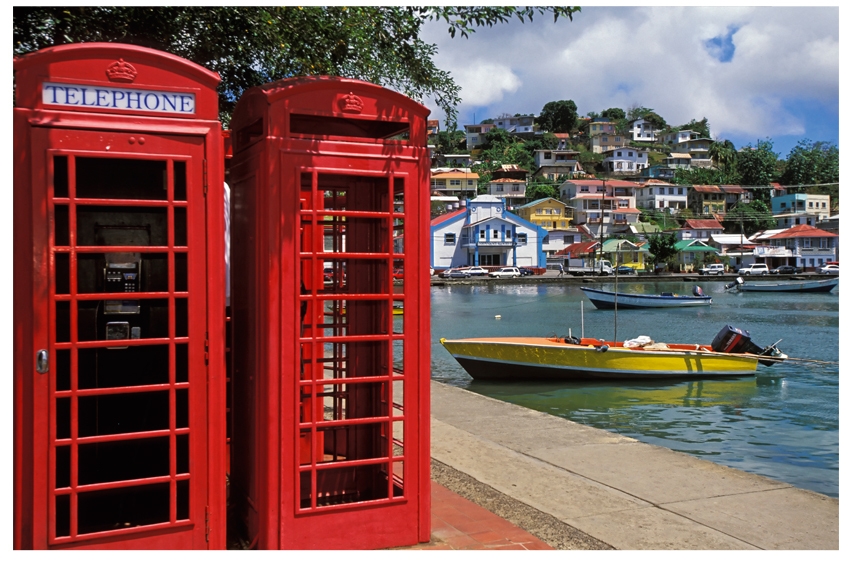Having visited most of the islands of the Caribbean when they were British colonies and since they were granted independence, I am convinced that Grenada, in the far south-east, is the fairest one of all. Its volcanic origin created wonderfully varied landscapes, from mountainous rainforests down to fertile plantations and a palmy littoral, brightened by bougainvillea, hibiscus, jasmine, orchids…. This is where Alec Waugh’s Island in the Sun, a novel about romantic miscegenation, was filmed with scandalous success.
My partner Diana and I came to Grenada this year for the ninth time. I planned to work on a novel and do some painting, but the very first day my typewriter broke down and somehow the tops wouldn’t come off the tubes of acrylics. Diana led the way to the beach. We kept up with news haphazardly, but noticed the 38th Independence Day last month, when Prime Minister Tillman (‘Uncle Tilly’) Thomas’s optimistic rhetoric was rich in metaphors: ‘Stand together, shoulder to shoulder, and with hands to the wheel, let us build together.’ He promised that his followers could ‘leapfrog pitfalls’. He needed all the optimism he could muster, because a general election is not far off, and Grenada is suffering economically. Tourism is down (Britain’s high tax on long-haul aviation is a handicap); unemployment is up to 30 per cent. Taiwan is dunning Grenada for a crippling old debt. Britain has closed its Grenadian consulate, so applicants for visas have to go to Barbados. Grenada is proud of its Arawak-Carib-Franco-British-African heritage. Independence now can feel lonely. The Queen’s portrait adorns the banknotes and coins of the Eastern Caribbean dollar. But it seemed it might be comforting to to have a specific reminder that Grenada is a member of the Commonwealth.
Then a reminder came. From the breakfast table on our hotel balcony overlooking Grand Anse and part of St George’s, the capital and principal harbour of Grenada, we saw HMS Fort Rosalie, a 23,384-ton Fleet Auxiliary vessel, in the berth usually occupied by one of those enormous cruise ships that look like Miami Beach hotels afloat. The Fort Rosalie can be described as only relatively rakish, but battleship-grey made a welcome change. She brought the royal family’s roving ambassador to the Eastern Caribbean to help a dozen former British colonial islands celebrate his mother’s Diamond Jubilee. HRH Prince Edward, the Earl of Wessex, at the age of 47, was a debonair Bertie-Woosterish figure in a panama hat. He was accompanied by his lissom blonde wife, Princess Sophie (ex-public relations), who was wearing a black and white dress of a pattern resembling first world war dazzle camouflage.
They attended a rally with music and marching in the National Stadium. He aroused cheers by unveiling a commemorative Jubilee plaque in the Botanical Gardens. They were transported in a motorcade, along country roads lined by children waving red, yellow and green Grenadian flags, to the Laura Herb and Spice Garden deep in St David’s Parish, where, according to an English widow who cultivates cocoa, ‘people are real’. It was in this setting of Ronald Firbank exoticism, in a midday temperature of 82 degrees and a gentle trade wind, that I encountered His Royal Highness. He smiled almost continuously as the director of the garden, Mary Barry, guided him along meandering nutmeg-shell pathways, between close-growing splendid trees and shrubs, and as he planted a symbolic nutmeg sapling in a specially prepared small clearing. The nutmeg embellishes Grenada’s flag. The Ministry of Agriculture had supplied a brand-new spade, which the Prince brandished in athletic poses for local photographers. Afterwards, he and Princess Sophie sipped several tiny cups of variously spiced tea and said how delicious they all were.
I found myself at the end of a line of the garden’s Grenadian employees, standing by a table bearing a large gift basket of spices. The Prince shook hands with each in turn and seemed interested by the answers when he asked, ‘What do you do?’ At last he shook my hand and said the usual few words and remained cordial even when I was bound to admit that in what Cole Porter once called ‘tropical splendour’ I did next to nothing. Sir Carlyle Glean, the amiable, elderly Grenadian governor general, agreed that the visitors were ‘a charming couple’. ‘The Prince,’ he added, ‘is a modern royal who interacts with all sorts of people.’ Whereupon the Prince and Princess joined Sir Carlyle in his official white BMW limousine, slightly behind schedule, and they were rushed by a police escort to the Spice Island Beach Resort, the costliest accommodation on the island, for lunch with Prime Minister Thomas and members of parliament. The resort manager said the luncheon was a state occasion, so the menu was secret, but he was confident that the chef would use nutmeg. ‘For details,’ he told me, ‘you should apply to the PM’s Chief of Protocol.’ However, my seersucker jacket was already damp with sweat, so I was in a hurry to change into swimming trunks. The beach bars serve excellent rum punch.






Comments